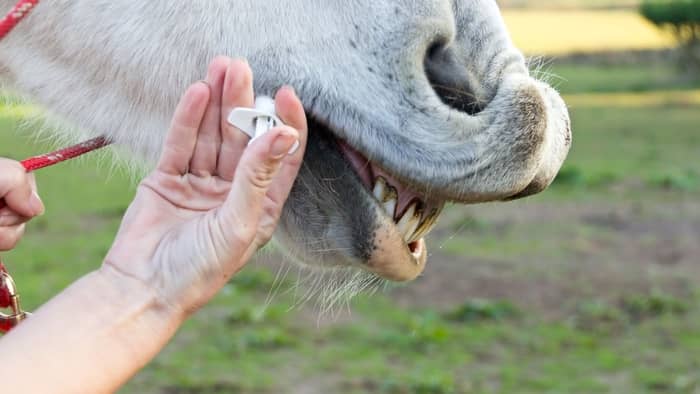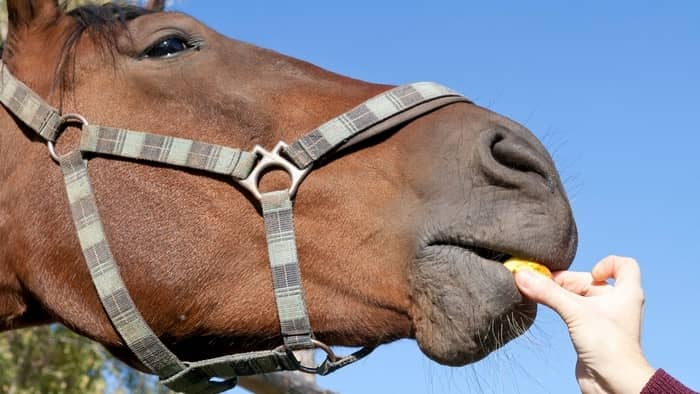Last Updated on February 27, 2022 by Griselda M.
Stomach ulcers in horses are very common, with up to 50% of horses suffering from this painful condition. But what is the best ulcer treatment for horses? And how can we help reduce stomach ulcers in horses? Let’s find out!
What Are Stomach Ulcers In Horses?
Stomach ulcers in horses are a painful and debilitating condition of the gastrointestinal tract. The correct name for stomach ulcers in horses is Equine Gastric Ulcer Syndrome (EGUS), although you may also hear them referred to as gastric ulcers.
When a horse has stomach ulcers, it will develop sores on the inner lining of the stomach. These ulcers are normally located on the upper portion of the stomach, above the area where gastric secretions are stored.
Stomach ulcers are incredibly common in horses, and many mild cases may never be diagnosed. Any horse can get stomach ulcers, but they are more prevalent in performance horses and those living in stables for long periods of time. Young foals are also susceptible to gastric ulcers.
What Causes Stomach Ulcers In Horses?
When a horse has stomach ulcers, it will develop sore areas of tissue on the inner lining of the stomach. These are caused by acidic gastric secretions splashing onto this sensitive area.
Gastric ulcers in horses are considered to be a man-made problem, and they are very uncommon in horses living in the wild. A horse is designed to eat large amounts of roughage over long periods of time, and continuously produces a steady supply of gastric juices to assist with the digestive process. These acids are normally diluted by the production of saliva, as well as the continuous supply of forage.
In the modern-day horse, we tend to feed them a higher quality diet in smaller quantities. This means that the horse does not produce as much saliva, and the stomach will also be empty for longer periods. The result is an excess of acidic gastric juices, which then splash onto the upper portion of the stomach and create ulcers.
There is also a link between horses that carry out high levels of exercise and stomach ulcers. It is thought that during exercise higher levels of gastric acid is produced, and the blood flow to the stomach is reduced.
Other factors that are linked to gastric ulcers in horses are high grain diets, stress, unnatural living conditions, and the administration of some medications.
What Is The Best Ulcer Treatment For Horses?
The best ulcer treatment for horses is one that will be prescribed by your veterinarian following a diagnosis of EGUS. This medication is called omeprazole and works by reducing the amount of gastric acid produced by the stomach. A course of omeprazole will normally take at least one month to be effective.
Unfortunately, omeprazole can be quite expensive, but there is no other medication that is quite as effective at treating gastric ulcers in horses.
Whilst the horse is being treated with omeprazole, other medications can be given to relieve the symptoms of stomach ulcers. One of these is sucralfate, which coats the sensitive lining of the stomach and helps the ulcers to heal. It is important to remember that sucralfate must not be given at the same time of day as omeprazole.
The most important factor to bear in mind when caring for a horse with stomach ulcers is that they will not resolve unless the underlying cause is removed. Omeprazole will help to heal the ulcers, but if management changes are not put in place the ulcers will recur as soon as treatment is stopped.
This means that management changes will need to be put in place to prevent the recurrence of the ulcers. If the horse is on a high exercise regime, this must be reduced. A small feed of alfalfa given half an hour before exercise can help to reduce the amount of excess stomach acid. Stabled horses should spend more time out at pasture, and be given access to forage at all times.
It is also important to reduce any stressful situations as much as possible. High-stress activities for horses include traveling, competitions, separation from equine friends, and long periods of confinement. The use of long-term anti-inflammatory medication must also be avoided if possible.
So, as well as giving omeprazole, the best ulcer treatment for horses is to allow them to live the most natural lifestyle possible!
Summary
So, as we have learned, the best ulcer treatment for horses is a veterinary medication called omeprazole. It is also important that the underlying cause of the ulcers is identified and removed. Ulcer treatment for horses is most effective when accompanied by changes in management and feeding of the horse.
We’d love to hear your thoughts on the best ulcer treatment for horses! Have you got a secret cure for stomach ulcers in horses? Or maybe you have a horse that is not responding to ulcer treatment? Leave a comment below and we’ll get back to you!
FAQs
What Are The Signs Of A Horse Having Ulcers?
A horse with stomach ulcers will show signs of low level discomfort, including behavior such as teeth grinding, irritable temperament, crib-biting, and wind sucking. A horse with ulcers may also lose weight or have a poor appetite.
How Do You Treat Ulcers In Horses Naturally?
Although veterinary medication is the gold standard for treating ulcers in horses, some herbal supplements can also help to relieve the symptoms. The most effective herbs tend to be those that are mucilaginous - this means they create a protective layer over the stomach lining. These include Marshmallow Root, Slippery Elm, Comfrey leaf, Licorice, and Meadowsweet.
Can Ulcers Heal On Their Own Horses?
If a horse has very mild ulcers, it is possible for them to heal on their own without any medication. However, it is important to ensure that the initial cause of the ulcers is removed, otherwise they will not heal on their own. This means you may need to alter the diet and management routine of your horse.
What Should I Feed My Horse With Ulcers?
A horse with gastric ulcers needs a high fiber diet, with little or no cereals and grains. Alfalfa hay is thought to be the best forage to feed a horse with ulcers, helping to protect the stomach lining from gastric acid.

